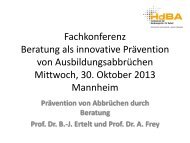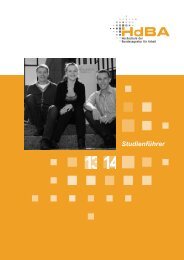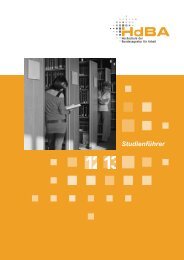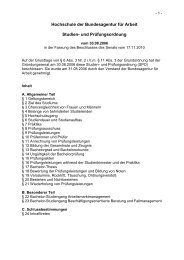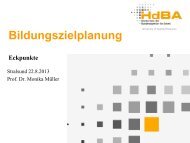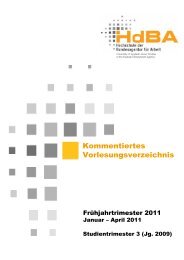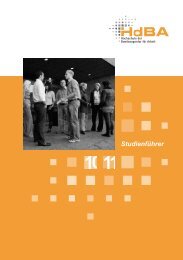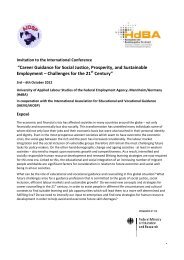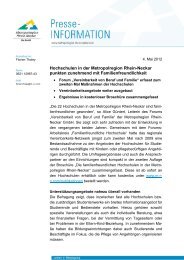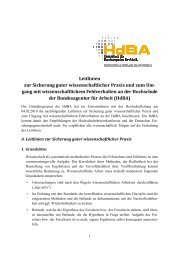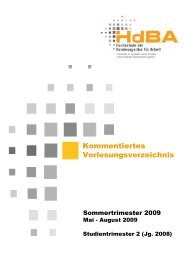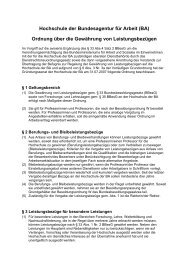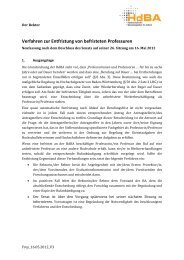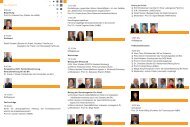Brain Drain - Hochschule der Bundesagentur für Arbeit
Brain Drain - Hochschule der Bundesagentur für Arbeit
Brain Drain - Hochschule der Bundesagentur für Arbeit
You also want an ePaper? Increase the reach of your titles
YUMPU automatically turns print PDFs into web optimized ePapers that Google loves.
���������������������������������������������������<br />
���������������������������������������<br />
�<br />
�<br />
5.4 Unit 3: Directions for Using Assessment Methods in BD-BG<br />
Counselling<br />
Regardless of all limitations and problems mentioned above, the counselling goals<br />
require the usage of assessment methods for each client in or<strong>der</strong> to provide:<br />
• Prognosis for the development of the client (extent of competitiveness, level of<br />
achievement, possible results, areas with probable difficulties);<br />
• Differentiation - to what extent the interests, abilities or values meet the<br />
requirements of the working or educational environment (in which educational or<br />
professional area they will achieve the best realization, to what extent they may fit<br />
the relevant work/cultural environment, etc.);<br />
• Monitoring of the client who helps the BD-BG counsellor in the assessment of the<br />
necessity of additional preparatory work with client before the interpretation of the<br />
assessment connected with prognosis and differentiation.<br />
The issue of the implementation of relevant formal methodologies for assessments<br />
arises so that the limitations from the implementation in multicultural context can be<br />
avoided to a maximum. We do not want to commit ourselves with a simple answer to<br />
that question but we will rather give some directions that will certainly be useful in<br />
avoiding the limitations of the cultural context of their application.<br />
The first direction is the possibility only to add the results from the formal<br />
methodologies to the results from other methods for interests and ability<br />
assessments (informal methodologies) or another is to do additional surveys during<br />
the interview. For example, let us take a look at the Strong test for professional<br />
interests’ measurement. The test is formal and it must only be used in a standardised<br />
form. If the form is not available or the BD-BG counsellor is not trained to use it, they<br />
may create a list of professions and specialties relevant to the culture of the client or<br />
to the professions in their country and after the client completes them, the counsellor<br />
uses the results for a follow up discussion, a complex of the themes and questions<br />
we will survey.<br />
The language misun<strong>der</strong>standings can be avoided in the same way because the<br />
proposed informal form of the test may allow more freedom in the implementation<br />
and a possibility for additional explanations of all the client’s questions. On the other<br />
hand it is possible to use only certain questions from a given test that we consi<strong>der</strong><br />
appropriate and with less culture dependence and which will be included in the<br />
interview. Language misun<strong>der</strong>standings and cultural context limitations will be<br />
avoided in this way.<br />
Having in mind that formal methodologies are only used when they are standardised<br />
and only by specially trained specialists, it is a good idea to create a database. The<br />
database should include standardized methodologies used in different countries by<br />
relevant specialists or methodologies suitable for BD-BG counsellors in or<strong>der</strong> to<br />
154



